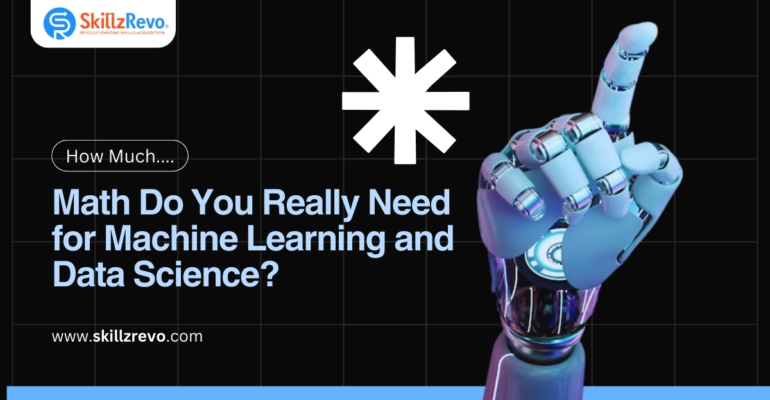How Much Math Do You Really Need for Machine Learning and Data Science?
How Much Math Do You Really Need for Machine Learning and Data Science?
For high-paying jobs on cutting-edge technology, machine learning and Data Science have become the current buzzwords to work on. But one question often haunts fresh entrants into the profession: Is it necessary to be a math genius to be successful? Certainly! Math is useful as the depth of subject matter requires varies depending on your role and area of specialization. With that in mind, let us have a look at some core math concepts that are prerequisites for Data Science and machine learning and some real-life math needed.
Key Math Concepts in Data Science & ML
Mathematics lays the foundation of Data Science and Machine Learning. Here are the core areas you should have a good grip on:
-
Linear Algebra
Linear algebra is truly the backbone of many Machine Learning models. Concepts of vectors, matrices, and tensor operations are extremely important, especially in deep learning. Algorithms such as Principal Component Analysis (PCA), Singular Value Decomposition (SVD), neural networks, etc., are heavily dependent on matrix operations.
-
Probability & Statistics
Probability is used to deal with uncertainty, a key property of machine learning models. Knowing probability distributions, Bayes’ theorem, and Markov Chains is an asset. Statistics, on the other hand, plays a key role in making decisions on hypothesis-testing, data-analysis, and A/B testing. Statistics assist you in finding patterns in the data and making informed decisions.
-
Calculus
While advanced calculus may not be required for every profile, basic calculus is important to understand optimization techniques. An example of calculus applied to machine learning is the Gradient Descent algorithm, which trains neural networks to minimize error and maximize accuracy by utilizing derivatives and partial derivatives.
-
Theoretical Math
In discrete mathematics, concepts like graph theory or combinatorics become very important for people who work with Natural Language Processing (NLP) or algorithms. They are used in decision trees, recommendation systems, and social network analysis.
The Importance of Mathematical Knowledge Varies with the Role
Mathematical knowledge required thus varies according to respective positions in Data Science and AI:
- Data Analyst– More concerned with statistics and data visualization than mathematical modeling. Basic concepts of probability and statistical analysis are fine.
- Data Scientist- Have good knowledge of statistics, probability, and machine learning concepts for the building of predictive models and interpretation of their results.
- Machine Learning Engineer- Good knowledge of linear algebra, calculus, and optimization algorithms for the development and tuning of models is required.
- AI Researcher- These we require advanced-level mathematics; probability, architectures of deep learning, and advanced calculus.
You would not necessarily need to know all the math behind these libraries or frameworks if you were working with predefined tools such as Scikit-learn, TensorFlow, and PyTorch. Nevertheless, understanding basics will help you debug, improve model performance, or customize algorithms whenever needed.
Can One Study Machine Learning and Data Science Without High-End Mathematics?
Definitely! Many professionals have come into this field with very little mathematics, going on to learn as they go. The secret is to start from the application point, that is, working with datasets, looking at visualization techniques, and gradually enhancing your mathematical knowledge. In the current era, tools like Python, R, and libraries like Pandas, NumPy, and SciPy take care of most of the hard calculations for you. Nevertheless, a conceptual understanding of the mathematical principles will help take sound decisions and optimize models efficiently.
SkillzRevo Gives You a Solution to Become Industry-Ready
At Skillzrevo, we appreciate how hard and overwhelming it feels trying to get into Data Science and AI, especially if you don’t have strong math. So, all our programs are structured to provide structured learning, hands-on projects, and expert mentorship so you can start to see the connection between theory and real-world applications. Gain confidence by applying mathematical concepts without being intimidated through interactive courses, industry-oriented projects, and one-on-one mentorship. Our courses provide an in-depth approach to Data Analytics, AI, and Machine Learning in the most practical learning way. So, don’t be intimidated by mathematics—start with real-world projects, learn at your pace, and gradually find your way into the field. With effective guidance and structured learning from SkillzRevo, you will master Data Science and Machine Learning no matter your starting point.









